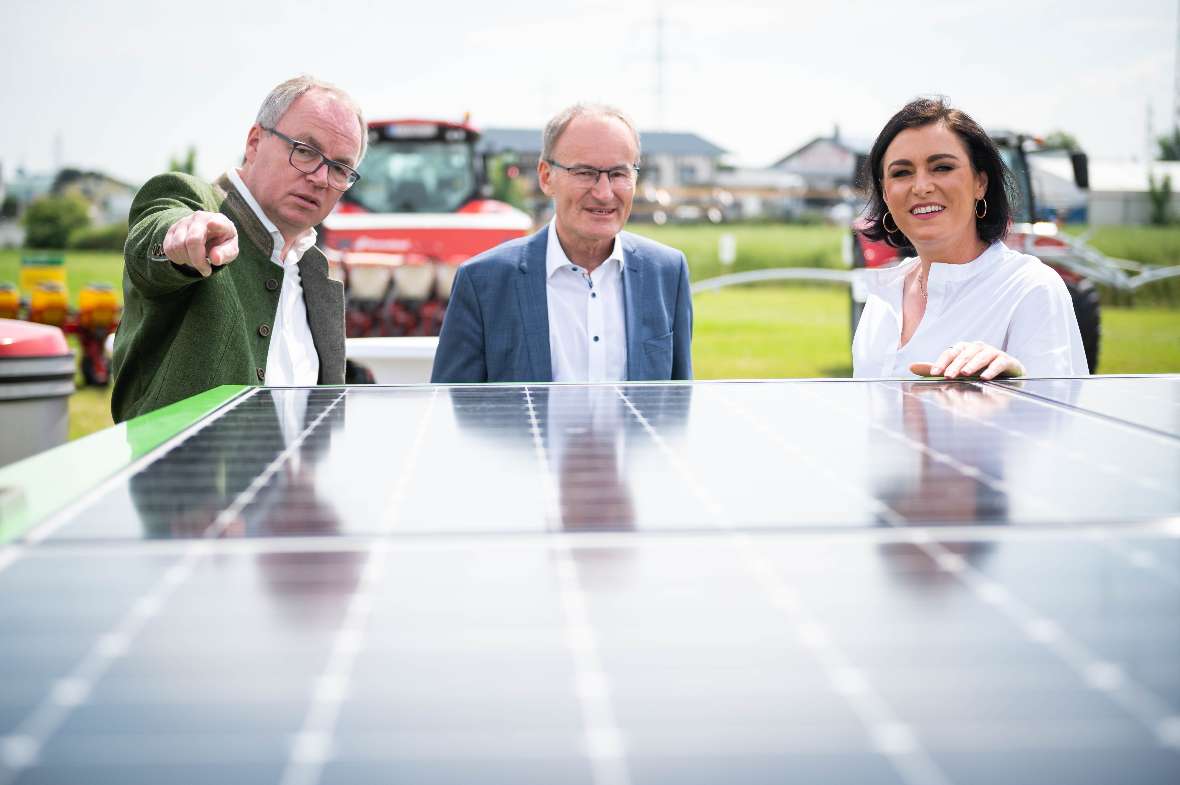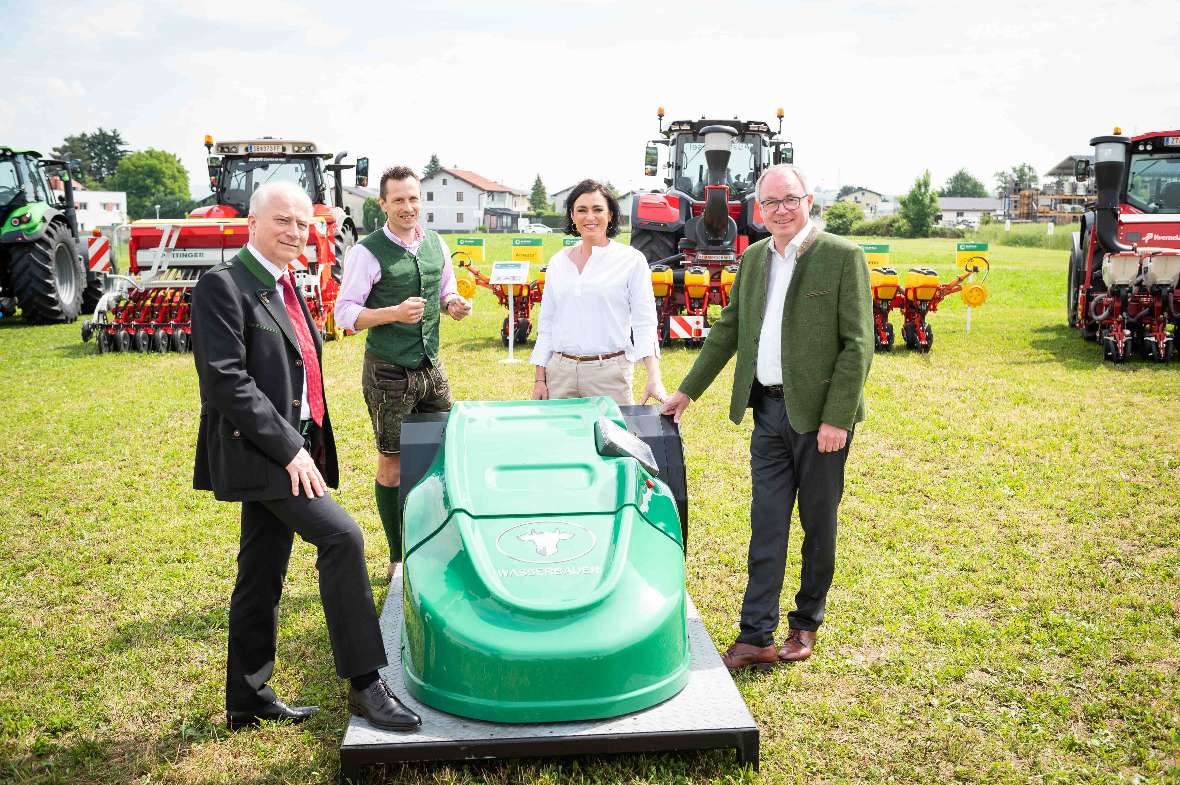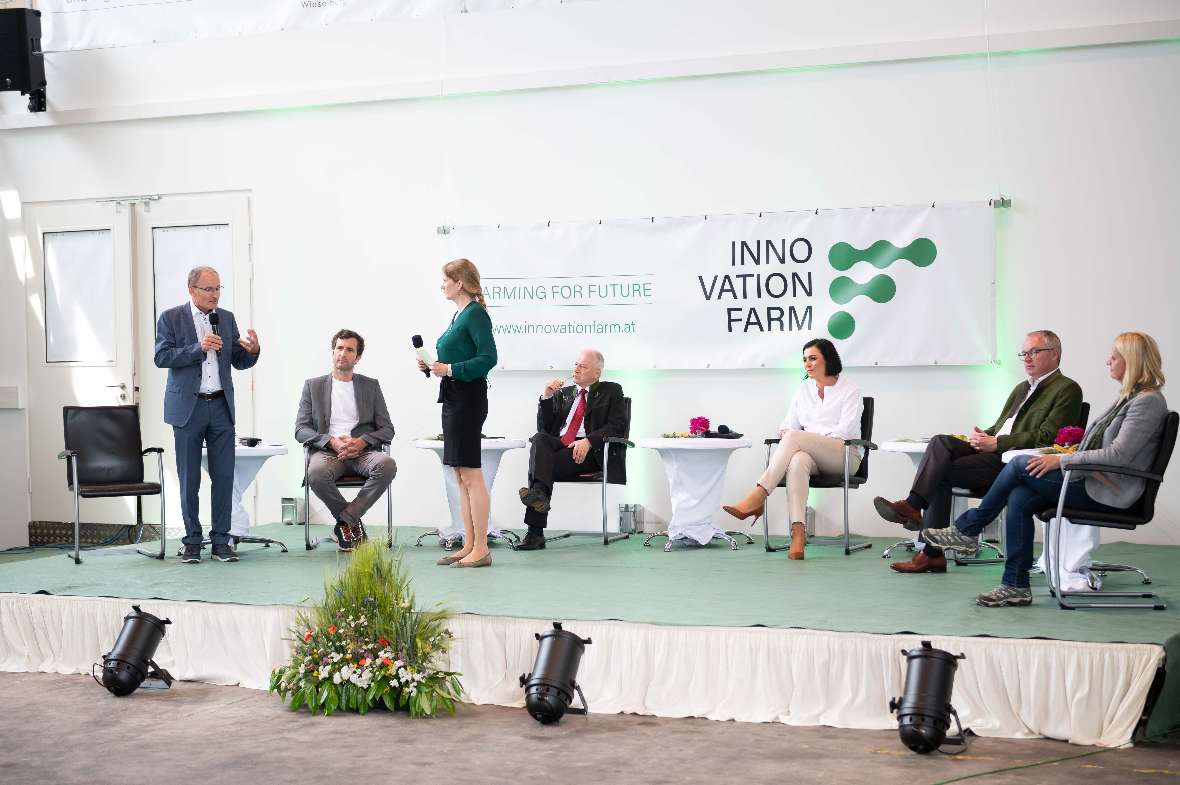-
_small.jpg/jcr:content/2021-06-11_InnovationFarmLive_%20(020)_small.jpg)
© FJ/Petra Renz zoom gallery -
_small.jpg/jcr:content/2021-06-11_InnovationFarmLive_%20(021)_small.jpg)
© FJ/Petra Renz zoom gallery -
_small.jpg/jcr:content/2021-06-11_InnovationFarmLive_%20(030)_small.jpg)
© FJ/Petra Renz zoom gallery -
© FJ/Petra Renz zoom gallery -
© FJ/Petra Renz zoom gallery -
_small.jpg/jcr:content/2021-06-11_InnovationFarmLive_%20(123)_small.jpg)
© FJ/Petra Renz zoom gallery -
_small.jpg/jcr:content/2021-06-11_InnovationFarmLive_%20(126)_small.jpg)
© FJ/Petra Renz zoom gallery -
© FJ/Petra Renz zoom gallery -
© FJ/Petra Renz zoom gallery -

© BMLUK/Paul Gruber zoom gallery -

© BMLUK/Paul Gruber zoom gallery -

© BMLUK/Paul Gruber zoom gallery
For a year now, new developments and technologies for agriculture have been tested at the Innovation Farm, tried out in practice and continuously reported on in print media and online. With the new format "Innovation Farm LIVE" a special insight into the daily research work was given. On Friday, June 11th, 2021 there was a live broadcast of the latest projects at the Innovation Farm in Wieselburg. Moderated by Verena Scherfranz from the University of Natural Resources and Life Sciences, experts, specialist editors and practitioners discussed the opportunities, benefits and potentials of digital technologies.
In his welcoming address, Director Alois Rosenberger emphasized the networking between research, education and practice. He was delighted to have the first Bachelor graduates of the "Agricultural Technology and Digital Farming" course at the Wiener Neustadt University of Applied Sciences, who are already working in the Innovation Farm. Franz Handler, head of the digitization in agriculture cluster, and Markus Gansberger (both HBLFA Francisco Josephinum), explained the concept of the cluster and the innovation farm at the beginning. New technologies are tested at the three locations in Wieselburg, Mold and Raumberg-Gumpenstein as well as in various pilot plants in the federal states. He emphasized the good cooperation with the manufacturing companies. The knowledge is processed accordingly and brought closer to agriculture together with the educational partners and media partners.
The presentation of innovative technologies for domestic agriculture took place in three blocks. In the first block, “Assistance systems and robotics”, the contribution that automation technology can make to making daily work easier was impressively demonstrated. Franz Handler gave an overview of the corresponding projects, e.g. Lindner Trac Link, Pöttinger Sensosafe, Krone Presse with TIM, Case combine harvesters with AFS Harvest Command and Grain Cam as well as Smart Command from Reichardt. The working methods of the field robots Farmdroid and Naio Oz or Dionysos, a project by Josephinum Research, were also impressive. The first-mentioned robot is equipped with a sowing and chopping technology and is increasingly being used in organic sugar beet, where otherwise a lot of manual work is required.
The second block was dedicated to the topic of "Animal Health and Animal Welfare" and was introduced by Christian Fasching, HBLFA Raumberg Gumpenstein. Animal welfare and health monitoring are central issues in animal husbandry. New technologies also support the farmer in the automation of work processes and provide information in order to be able to detect diseases at an early stage. The butler from Wasserbauer, the manure removal robot from Lely, the heat detection from Nedap, a pasture GPS, the health system from Smaxtec, Smart Vet Sense, etc. were presented.
The third block "Resource Efficiency and Precision Farming" was presented by Markus Gansberger. The focus was on technologies that enable more ecological and economical management to increase resource efficiency. IQBlue from Lemken enables optimized tractor control to save fuel using the attachments, while Seedbed Control from Pöttinger optimizes seedbed preparation by controlling the roughness of the ground. The site-specific (maize) sowing and site-adapted fertilization with optimized border spreading equipment are generating growing interest in practice, and the necessary technologies were presented. Experts from the Mold Innovation Farm reported on the new developments in weed regulation.
Between the individual blocks, statements from managing directors of international agricultural machinery companies were recorded by video (including by Markus Baldinger, Pöttinger; Josef Horstmann, Krone; Justus Dreyer, Amazone; Stefan Lindner, Lindner, Stefan Scherer, Smaxtec, Franz Heinzlmaier, Borealis) and also answered video questions from pupils and students.
The media play an important role in ensuring that the new knowledge reaches the farmer. The challenges were discussed in a talk with four editors from agricultural media. Guido Höner, editor-in-chief of top agrar, Sepp Kellerer, editor-in-chief of Bayerischer Landwirtschaftliche Wochenblatt, Wolfgang Dürnberger, editor-in-chief of Salzburger Bauer und Bauernjournal and Stefan Nimmervoll, editor of Blick ins Land discussed the increasing digitization in agriculture in Bavaria and Austria, and the role of Agricultural media in order to be able to increase acceptance.
The event ended with a top-class panel discussion moderated by Anni Pichler, Upper Austrian Farmers' Union. In addition to the Federal Minister for Agriculture, Regions and Tourism Ms. Elisabeth Köstinger and the President of the Austrian Chamber of Agriculture, Mr. Josef Moosbrugger, LH-Deputy Stephan Pernkopf (Lower Austria), Provincial Councilor Johann Seitinger (Styria), Franziska Fröschl, farmer and representative on the Maschinenring national board, and Timo Küntzle, journalist and agricultural engineer, on the podium.
In the introductory interview, Heinrich Prankl, head of research at the Francisco Josephinum and initiator of the Innovation Farm, explained that after a good year of work, over 30 projects are already being worked on. Due to the good cooperation between the cooperation partners, together with the manufacturing companies, media and education partners, the Innovation Farm has developed into a first-class address. Above all, the innovation farm should work out the benefits of new technologies.
Elisabeth Köstinger underlined the essential task of the Innovation Farm, namely to make digitization visible and tangible. There are three main goals in the foreground: Ease of work, sustainability and animal welfare. In any case, the provision of a free RTK correction signal for lane guidance systems is well received by the agricultural sector. Education and training in the agricultural school system is a model for success. Josef Moosbrugger emphasized that the cost / benefit calculation must fit and that new developments must therefore bring advantages for farms. This is not always guaranteed due to the small-scale agriculture in Austria. Franziska Fröschl was of the opinion that a farm cannot ignore digitization. Open communication is important, which was also underlined by Federal Minister Köstinger. Johann Seitinger emphasized that digitization in animal husbandry has enormous potential in terms of resource efficiency, animal health and marketing. Stephan Pernkopf was of the opinion that robotics in arable farming will make a very important contribution in the future. Sustainable intensification is important in order to reduce dependency on imports. Water is a scarce resource. Timo Küntzle, himself a journalist, emphasized that digitization also poses the risk of increasing data transparency. It is important to communicate openly and honestly about agriculture.
After the event, Federal Minister Köstinger was available for a small talk for the pupils of class 4LWa of the Francisco Josephinum.
The event is available as a video stream at www.innovationfarm.at.
